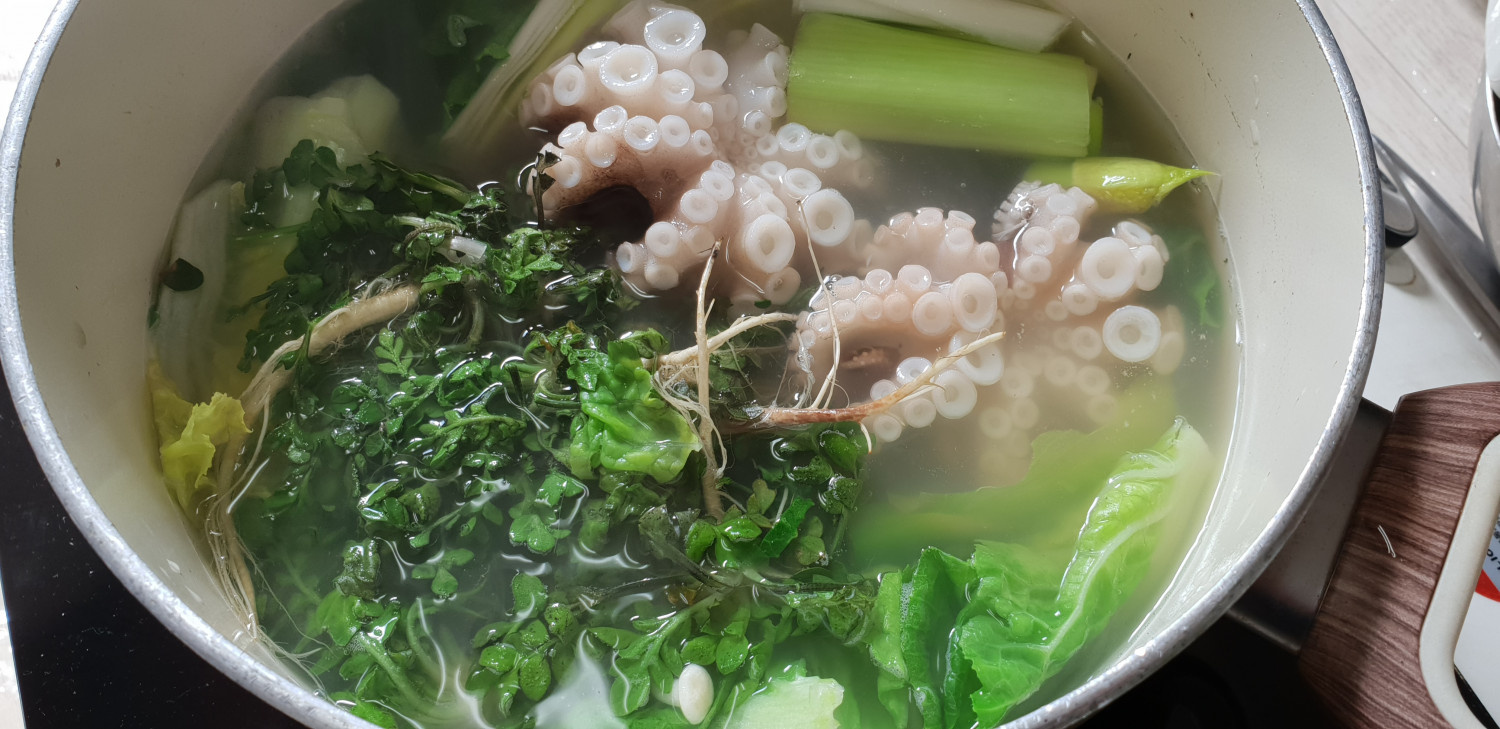Spring Blossom Jjukkumi and Namul Shabu-Shabu
Jjukkumi Shabu-Shabu with Abundant Spring Namul ‘Naengi’

During a recent trip to Seocheon, I stumbled upon a lively jjukkumi (baby octopus) festival! I learned that a local delicacy there is jjukkumi shabu-shabu enriched with ‘naengi,’ a flavorful spring vegetable. Recreating this at home was a delightful experience – the combination of fragrant naengi and chewy jjukkumi is truly sensational. It’s a perfect dish to welcome spring and savor its delicate flavors.
Main Ingredients- 1kg Jjukkumi (baby octopus)
- 1/2 geun (approx. 250g) Naengi (field cress/shepherd’s purse)
- 1 small head Napa cabbage
- 1 handful Chives
- 1 handful Minari (water parsley)
- 1 pack King oyster mushrooms
- 2 stalks Green onions
Shabu-Shabu Broth- 2 sheets Dried kelp (dasima), palm-sized
- Approx. 20 Dried anchovies (for broth)
- 3 Tbsp Soy sauce for soup (guk-ganjang)
- 1 liter Water
- 2 sheets Dried kelp (dasima), palm-sized
- Approx. 20 Dried anchovies (for broth)
- 3 Tbsp Soy sauce for soup (guk-ganjang)
- 1 liter Water
Cooking Instructions
Step 1
Naengi, a beloved spring vegetable, is cherished for its wonderful aroma and nutritional benefits, often enjoyed in seasoned dishes or soups. First, carefully remove any yellowing or withered leaves from the naengi and rinse it thoroughly under running water. Prepare the chives, Napa cabbage, mushrooms, minari, and green onions by washing and trimming them as needed.

Step 2
To prepare the jjukkumi, sprinkle a generous amount of coarse salt over them (without removing the innards yet) and gently knead them. This process helps to remove any slimy residue and impurities, ensuring a cleaner taste. After kneading with salt, rinse the jjukkumi thoroughly under cold running water multiple times.

Step 3
Now, let’s make the shabu-shabu broth. In a pot, combine 1 liter of water, 2 sheets of dried kelp, and about 20 dried anchovies. Once the water comes to a boil, remove the kelp immediately to prevent a bitter taste. Reduce the heat to low and simmer for another 5 minutes to extract the anchovy flavor. Finally, stir in 3 tablespoons of soy sauce for soup (guk-ganjang) to season the broth.

Step 4
Cut the prepared vegetables into bite-sized pieces. Separate the Napa cabbage leaves and stems, and chop them. Cut the chives and minari into lengths of about 5-6 cm. Trim the base of the king oyster mushrooms and separate them into strands. Slice the green onions diagonally. Drain the prepared jjukkumi well and place them in a colander.

Step 5
Once the broth is simmering, add the Napa cabbage first and cook until it softens slightly. Next, add the minari, king oyster mushrooms, and chives, cooking for a brief moment. Then, introduce the naengi and jjukkumi. Cook until the jjukkumi turns pink and is fully cooked, which should only take about 1-2 minutes. Be careful not to overcook, as it can make the jjukkumi tough.

Step 6
Carefully remove the cooked jjukkumi from the broth and cut them into manageable pieces, about 2-3 cm in size. You can also cook the heads of the jjukkumi separately for a different texture. Enjoy the tender jjukkumi and fragrant naengi dipped in your favorite sauce, along with the warm broth.

Step 7
The combination of chewy jjukkumi and aromatic naengi, dipped in a sweet and tangy gochujang-based sauce, is absolutely divine! After enjoying the shabu-shabu, don’t discard the flavorful broth. It’s perfect for cooking udon noodles or thin wheat flour noodles (kal-guksu) for a satisfying and delicious final course. Experience the true taste of spring with this special dish!



